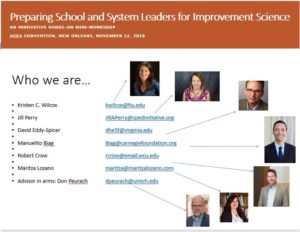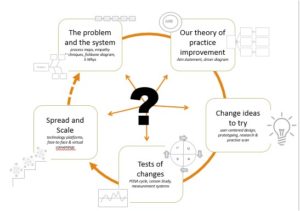Improvement Scholars Teaming Up to Help Prepare School and Systems Leaders for Improvement Science
By Kristen C. Wilcox
School and system leaders need innovations that help them to produce improvements that address disparities of opportunities and outcomes experienced by too many marginalized youth in K-12 schools. Innovative practices that re-center leaders’ attention on the agency and voices of those in communities (in and outside of schools) and de-center traditional hegemonic structures that suppress them are of high currency as unprecedented demographic shifts and needs for rapid innovation require adaptable school “improvement infrastructures”. In particular, leaders need to know how to engage all stakeholders in promoting continuous learning in their respective organizations.
Improvement science (IS) serves as a resource for such learning. Improvement Science is predicated on the principle that for improvement to take hold and be sustained over time, the work needs to be “problem-specific and user-centered”: That is— the participatory engagement of stakeholders is key to improving. Further, IS proposes that through garnering a diversity of perspectives, school leaders can successfully foster improvement initiatives that facilitate individuals’ “seeing the system that produces the outcomes”. Importantly, addressing opportunity and outcome disparities relies upon two other IS principles: 1) identifying root causes for “variations in performance” and 2) using measures by which to assess impacts of improvement initiatives.
The Carnegie Foundation for the Advancement of Teaching Improvement Scholars Present at the University Council for Educational Administration Mini-Workshop
 Kristen C. Wilcox, along with NYKids partners Nancy Andress and Susan Tangorre from the Capital Area School Development Association (CASDA), co-developed COMPASS-AIM, a process to support continuous school improvement. Wilcox led a University Council for Educational Administration (UCEA) mini-workshop with colleagues from the Carnegie Foundation for the Advancement of Teaching Improvement Scholars Network in New Orleans on November 22nd. Workshop participants learned about how they can model the work of IS and engage others in using IS strategies and tools.
Kristen C. Wilcox, along with NYKids partners Nancy Andress and Susan Tangorre from the Capital Area School Development Association (CASDA), co-developed COMPASS-AIM, a process to support continuous school improvement. Wilcox led a University Council for Educational Administration (UCEA) mini-workshop with colleagues from the Carnegie Foundation for the Advancement of Teaching Improvement Scholars Network in New Orleans on November 22nd. Workshop participants learned about how they can model the work of IS and engage others in using IS strategies and tools.
How is Improvement Science Different than Other School Improvement Approaches?
To foreground the workshop, the improvement scholars highlighted two aspects of school improvement that are top priorities not only in the United States, but globally, and point to the value and relevance of improvement science now:
1) Improvement Science addresses educational opportunity and outcome disparities for the marginalized directly through attention to outcome disparities.
2) Improvement Science provides actionable strategies and tools leaders can use with frontline professionals, youth, families, and other community members in their work to accelerate improvement across networks.
The Improvement Journey
The Improvement Scholars (Kristen C. Wilcox, Jill Perry, David Eddy-Spicer, Manuelito Biag, and Robert Crow) facilitated the workshop organized into four phases, including:
- Phase 1: Engaging with problems of practice through two exemplars of improvement initiatives in Chesterfield County Public Schools, VA (David Eddy-Spicer) and Fort Plain Central School District (Kristen C. Wilcox).
- Phase 2: Hearing from leaders’ experiences with improvement science through videos available from EdX
- Phase 3: Diving into the improvement journey
- Phase 4: Sharing and reflecting on learning
Diving into the Improvement Journey
The Improvement Scholars facilitators engaged workshop participants in the improvement journey with hands-on modeling using Improvement Science strategies and tools. For example, developing aim statements can be a daunting task while articulating a theory of improvement. To help learn how to do this, Wilcox engaged workshop participants in evaluating aim statements. Good aim statements clearly answer the question: What are we trying to accomplish? They need to be:
- Specific: Specific yet representative of overarching goal (compelling)
- Measurable: By how much?
- Time-bound: By when?
- Targeted: For whom and in what contexts?
Through exemplars of improvement science in action, leaders’ testimonials of learning about and using improvement science, and hands-on guided learning opportunities, leaders can enhance others’ learning about engaging in improvement using IS strategies and tools.
For more information, see the PowerPoint from this workshop and reach out to NYKids if you or others in your network are interested in learning more about leveraging improvement science for continuous improvement.

